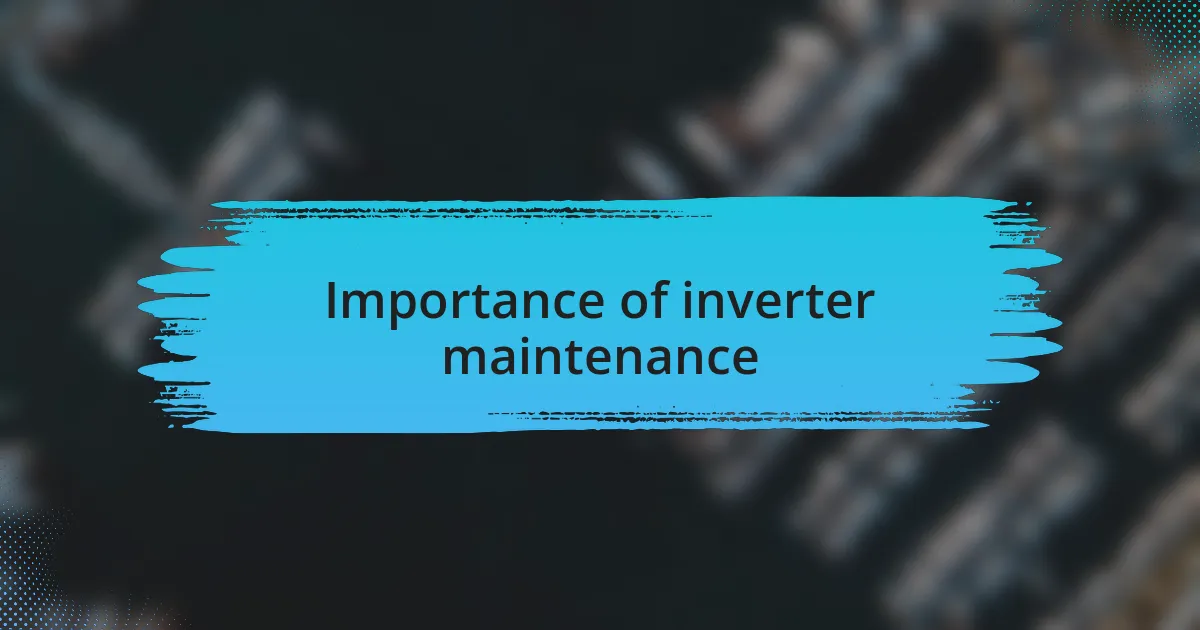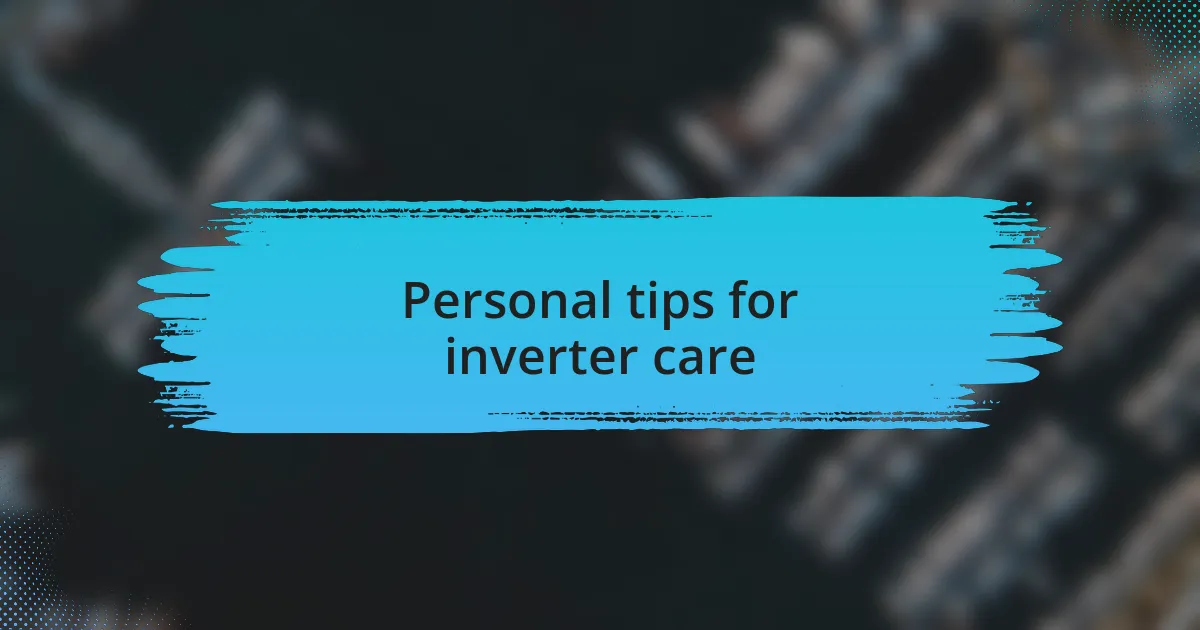Key takeaways:
- Inverter systems convert DC power to AC for yacht appliances, making maintenance crucial to ensure comfort and avoid outages.
- Regular checks on inverters can prevent costly repairs and enhance the overall luxury experience on a yacht.
- Understanding power demands and maintaining equipment can transform potential crises into enjoyable moments on the water.
- Monitoring battery health and having a backup plan are essential to ensure reliability and safety onboard.

Understanding inverter systems
Inverter systems play a crucial role in converting DC (direct current) power from batteries to AC (alternating current) power for various appliances on a luxury yacht. I remember my first encounter with an inverter on a yacht trip; it amazed me how something so compact could power everything from a flat-screen TV to the gourmet coffee machine. Have you ever flipped a switch, expecting nothing but silence, only to be enveloped in the hum of your favorite device?
The sophistication of inverter systems often goes unnoticed until they fail. I once witnessed a friend’s assistant struggling with faulty inverters during a charter; it was not just inconvenient but transformed the experience from luxurious to frustrating in seconds. It made me appreciate how important maintenance and understanding your inverter’s specifications are to keeping the yacht’s environment comfortable and enjoyable.
Every inverter has its own unique characteristics, such as output waveform and capacity, that influence its performance on the water. I’ve learned that examining these specifications before you set sail can make a world of difference—imagine having the power to run your air conditioning on a hot summer day versus being left in the heat. What features would you prioritize in your journey for comfort? Understanding these details not only enhances your cruising experience but also ensures that you can fully enjoy the luxury that comes with yacht ownership.

Importance of inverter maintenance
Inverter maintenance is not just about keeping the lights on; it’s a vital practice that ensures the safety and enjoyment of your yacht experience. I remember a trip where one small oversight—a neglected inverter—led to an unexpected blackout. The abrupt silence felt oppressive, and the panic that set in was a stark reminder of how crucial these systems are. If I had taken the time to maintain that inverter, I could have avoided a stressful situation that disrupted our day at sea.
Regular checks on your inverter can prevent costly repairs down the line. I’ve seen owners faced with exorbitant repair bills simply because they overlooked routine maintenance. Imagine being anchored in a picturesque bay, with the sun setting, and your fridge goes out due to an inverter failure! The thought of losing all that carefully stocked gourmet food is enough to motivate anyone to prioritize inverter care.
Moreover, a well-maintained inverter ensures that you get the most out of your onboard systems, enhancing the overall luxury experience. When everything operates smoothly, it allows you to focus on what matters—relaxation and enjoyment. How much more enjoyable would that sunset be with the assurance that your inverter is in peak condition? This peace of mind transforms sailing into the ultimate indulgence.

Luxury yachts and power demands
Luxury yachts have unique power demands that stem from their sophisticated systems and amenities. I recall a luxurious charter where we had multiple air conditioning units, gourmet kitchen equipment, and even a cinema onboard. The sheer demand for power was astounding and made me realize how efficiently the inverter needed to function. It’s fascinating to think about how these systems work seamlessly—until they don’t, and then the luxury experience can falter.
The capacity of an inverter directly influences how well all on-board systems perform, from lighting to entertainment. I once noticed that when we were running multiple high-demand appliances simultaneously, the inverter struggled, causing flickering lights. That moment was a gentle reminder of how vital it is to understand power requirements and ensure everything is properly managed. Have you ever considered how a small miscalculation in power needs could impact your entire yacht experience?
Optimizing power usage on a luxury yacht is not just about convenience; it can be a matter of safety. During a recent trip, a fellow yacht owner faced a crisis when their inverter malfunctioned during a storm. The fear and uncertainty that extended through the crew highlighted the importance of making informed decisions about power management. With proper care and foresight, managing the power demands of a luxury yacht can transform potential disasters into serene moments spent savoring sunsets.

My experience with inverter care
When it comes to inverter care, I’ve learned that regular maintenance makes all the difference. A few months ago, I took the time to inspect the connections and clean the filters on our inverter. To my surprise, this simple act not only improved its performance but also extended its lifespan. Have you ever neglected a small task only to have it turn into a bigger problem later?
On another occasion, I faced a situation where the inverter unexpectedly failed during a sunset cruise. Watching the elegant waves shimmer under the fading light, I suddenly felt the dampening impact of losing power. It was unsettling to think about how quickly luxury can turn into frustration. I quickly discovered the importance of having a backup plan, ensuring that our power supply is reliable so that moments like these remain magical.
What I’ve come to realize is that inverter care isn’t just a technical necessity; it’s about safeguarding experiences. After that cruise, I made it a point to document every maintenance task in detail. This proactive approach not only alleviated my worries but also fostered a sense of ownership over the entire power management process. Isn’t it comforting to know that with a little effort, you can enhance both the safety and enjoyment of your time on the water?

Best practices for inverter upkeep
Best practices for inverter upkeep
Regularly checking your inverter can be a game-changer. I always set a reminder every few months to inspect the battery connections and ensure they’re clean and tight. This small routine has saved me from potential issues down the line—hasn’t everyone experienced a nagging feeling that something isn’t quite right with a critical component?
One thing that surprised me was the role of temperature in inverter performance. I remember one hot summer day when I noticed our inverter running a bit warmer than usual. By simply relocating it to a cooler, well-ventilated area, I was able to enhance its efficiency significantly. It’s fascinating how adjusting the environment can make such a difference, isn’t it?
Lastly, I can’t stress enough the importance of keeping an eye on error codes and regularly updating firmware. There was a time when an unexpected shutdown had me scrambling, only to find that a simple update could have prevented it. Staying informed and addressing those little alerts can truly make the difference between a seamless voyage and a power outage. Have you ever let a minor warning slide, only to regret it later?

Common inverter issues to avoid
When it comes to inverters, one of the most common issues I encounter is the dreaded overloading. I’ve learned the hard way that connecting too many devices can cause the inverter to trip, which always leaves me in a lurch, especially during a critical moment. Have you ever felt that sinking feeling when your power unexpectedly cuts out because you pushed it too far? It’s a reminder that being mindful of power limits is essential for smooth sailing.
Another pitfall I’ve witnessed involves corrosion on battery terminals. This isn’t just a minor irritation—it can lead to significant power losses over time. I remember discovering a buildup after returning from a long trip. Cleaning those connections not only restored power but gave me peace of mind knowing that my system would function properly. So, how often do you check those little details that can make a larger impact?
Lastly, neglecting ventilation can create serious problems. On one occasion, I ignored my instinct when the inverter began to emit an unusual sound. It turned out that insufficient airflow had caused overheating. After that experience, I made it a point to regularly assess airflow around my inverter. How many of us don’t realize that small adjustments could prevent larger headaches down the line?

Personal tips for inverter care
Maintaining your inverter is crucial for its longevity. I’ve found that regular inspections can save a lot of headaches. For me, dedicating time each month to check cables and connections feels like a small investment with big returns, especially when you consider the downtime that can occur from neglect. Have you ever thought about how a few minutes of maintenance can protect your valuable equipment?
Another tip I’d recommend is monitoring battery health closely. I remember one trip where I let my batteries go unchecked for too long, and I ended up with poor performance just when I needed it most. It’s fascinating how a simple multi-meter can be a game-changer—checking voltage regularly not only helps in keeping an eye on battery life but gives you that added confidence to navigate uncharted waters. How often do you feel prepared by being proactive?
Finally, don’t underestimate the importance of having a backup plan. After a power failure in the middle of a sunset dinner, I became a firm believer in redundancy. I now keep a portable generator on board for emergencies. It’s comforting to know that I have options if something goes wrong. Wouldn’t you agree that feeling prepared lets you enjoy the journey just a little bit more?